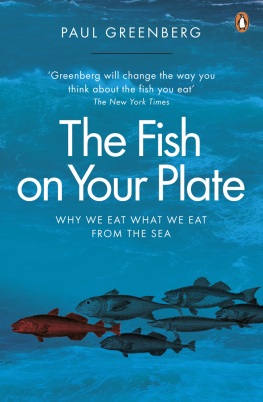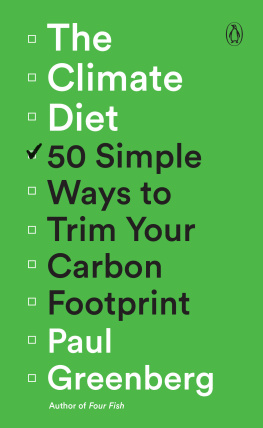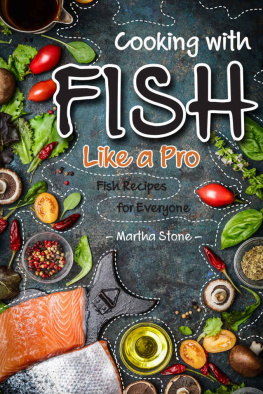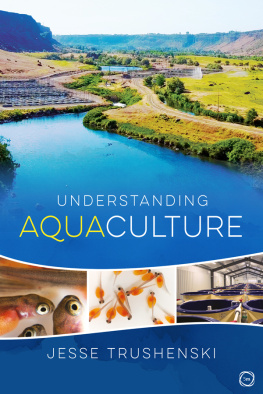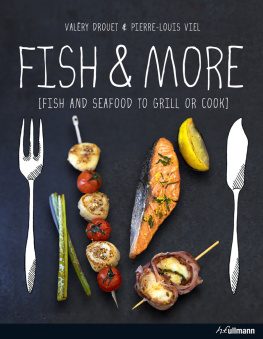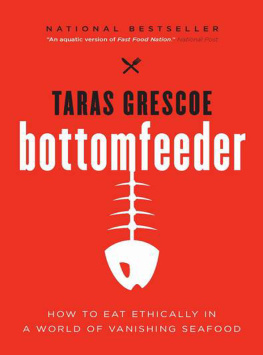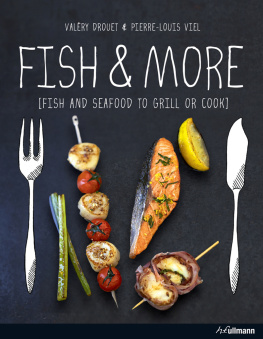PAUL GREENBERG
The Fish on Your Plate
Why We Eat What We Eat From the Sea
PENGUIN BOOKS
PENGUIN BOOKS
Published by the Penguin Group
Penguin Books Ltd, 80 Strand, London WC2R 0RL , England
Penguin Group (USA) Inc., 375 Hudson Street, New York, New York 10014, USA
Penguin Group (Canada), 90 Eglinton Avenue East, Suite 700, Toronto, Ontario, Canada M4P 2Y3
(a division of Pearson Penguin Canada Inc.)
Penguin Ireland, 25 St Stephens Green, Dublin 2, Ireland (a division of Penguin Books Ltd)
Penguin Group (Australia), 250 Camberwell Road, Camberwell, Victoria 3124, Australia (a division of Pearson Australia Group Pty Ltd)
Penguin Books India Pvt Ltd, 11 Community Centre, Panchsheel Park, New Delhi 110 017, India
Penguin Group (NZ), 67 Apollo Drive, Rosedale, Auckland 0632, New Zealand
(a division of Pearson New Zealand Ltd)
Penguin Books (South Africa) (Pty) Ltd, 24 Sturdee Avenue, Rosebank, Johannesburg 2196, South Africa
Penguin Books Ltd, Registered Offices: 80 Strand, London WC2R 0RL , England
www.penguin.com
First published in the United States of America by The Penguin Press, a member of Penguin Group (USA) Inc. 2010
First published in Great Britain by Allen Lane 2010
Published in Penguin Books 2011
Copyright Paul Greenberg, 2010
Introduction copyright HSH the Sovereign Prince of Monaco, 2011
All rights reserved
Excerpt from Up in the Old Hotel by Joseph Mitchell. Copyright 1992 by Joseph Mitchell. By permission of Pantheon Books, a division of Random House, Inc.
Except in the United States of America, this book is sold subject to the condition that it shall not, by way of trade or otherwise, be lent, re-sold, hired out, or otherwise circulated without the publishers prior consent in any form of binding or cover other than that in which it is published and without a similar condition including this condition being imposed on the subsequent purchaser
ISBN: 978-0-14-197159-9
ABOUT THE AUTHOR
Paul Greenberg has been fishing since childhood, and writing for The New York Times, National Geographic and GQ since adulthood. In 2005, his New York Times Magazine article on Chilean Sea Bass received the International Association of Culinary Professionals award for excellence in food journalism. Paul Greenberg received a James Beard Award for Writing and Literature for this book. Greenberg has also received both a National Endowment for the Arts Literature Fellowship and a Food and Society Policy Fellowship.
For Esther, who knows the depths
PENGUIN BOOKS
THE FISH ON YOUR PLATE
Not only the best analysis Ive seen of the current state of both wild and farmed fish its a terrific read Mark Bittman, author of How to Cook Everything and Food Matters
The signal quality of Greenbergs book is its genial and sometimes despairing struggle with contradiction. Not many who argue for our planets endangered species also write the thrill of hunting them. Like the fish he once hooked, he plunges away and is reeled back a serious and searching study. Written with wit and beauty, it is also play Los Angeles Times
Required reading Greenberg is an unfailingly entertaining writer, and his book arms you with the information you need to make intelligent choices when you are confronted by the offerings at the fish counter Atlantic
An elegantly composed and strikingly level-headed inquiry into our relationship with the fish we eat and the waters that sustain them Tom Fort, Sunday Telegraph
A powerful case for action combining on-the-ground and on-the-ocean reporting from the Yukon to Greece, from the waters off New England to the Mekong Delta, along with accounts of some stirring fishing trips, Greenberg makes a powerful argument marvelous exploration of that contradiction, a necessary book for anyone interested in what we take from the sea to eat, and how and why Sam Sifton, Scotsman
Paul Greenberg observes in a sharp and occasionally lyrical book we are at a significant moment Economist
Greenbergs thesis is a compelling one. We are doing the same thing to fish that we have done in the past to mammals and birds: selecting a handful of desirable species for domestication and abandoning the rest to gradual extinction. We have domesticated goats, sheep, pigs and cattle; we have domesticated chickens, geese, ducks and turkeys. And we are now dewilding, to use Greenbergs phrase, the four species of fish that dominate the marketplace: salmon, cod, sea bass and tuna Globe and Mail
U NDERSTANDING N ATURE AND M AN , F OR B ETTER P ROTECTION
Activists and commentators alike readily highlight the complexity of any environmental action. The global scale of the problems, the range of parameters to be considered and the long time-scales of the phenomena involved are just some of the obstacles to resolute and effective action.
However, these are not the only difficulties. In addition to this objective data, conservationists must deal with daily hurdles, which while less directly discernable are no less significant since they relate to the very contradictions of the human soul. Indeed, we know that we must first search in our hearts and minds for the true dangers that threaten the planet.
Not underestimating mans aspirations, attempting to reconcile human development and protecting the environment, understanding the curious mechanisms that make us want to eat wild fish, but in industrial quantities these are the major demands that Paul Greenberg helps us to understand.
I think that the work you hold in your hands provides a rare and beneficial insight into all these aspects. By exploring the profound, legitimate contradiction of our societies and our individual aspirations, Paul Greenberg in fact shows the reality and complexity of the commitment to protect our planet, while coming up with highly relevant strategies for this now vital struggle.
Between the need to protect and desire to consume, between the dream of untouched nature and the issue of feeding the world, there are indeed conflicts that are not as simple or as dualistic as a hasty interpretation of things may imply.
By questioning our practices and ambitions, Paul Greenberg invites us to consider the different responses to be conceived, since the idea of a single solution to the thousand ills that affect the marine environment, and in particular those concerning the erosion of biodiversity and the depletion of fishing stocks, seems utopian.
Among these responses, I see at least three.
A political response, of course, which requires better regulation of marine resources, facing up today to the shortcomings and obsolete nature of international standards.
An industrial and scientific response, which requires developing alternatives to current energy and nutritional choices. Here, algae present favourable prospects, but there are others which we must also encourage.
The third avenue that we must explore is what I call a philosophical response, which is to wonder about a society whose unbridled consumerism is becoming a threat to itself.
Even beyond strictly maritime issues, this is a problem that should concern us all, rich or poor, both coastal residents and those living in continental regions, meat-eaters or fish lovers, and must push us to work together to create another way of thinking and developing, to be better able to ensure the long-term survival of the species, that of the fish as well as our own.
It is through such practical and bold considerations, through this individual awareness and by working together that we can hope to come up with the solutions that we can use sustainably to protect the planet, together.

